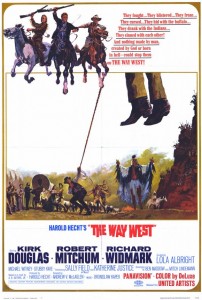Kirk Douglas. [intlink id=”449″ type=”category”]Robert Mitchum[/intlink]. [intlink id=”248″ type=”category”]Richard Widmark[/intlink]. Bid Borefest. Hard to imagine that those four phrases would ever go together, but in the sad case of 1967’s The Way West, they do.
Immensely so. Originally I felt like looking at one of [intlink id=”78″ type=”category”]Kirk Douglas[/intlink]’ films in honor of the star’s 95th birthday and for some reason selected The Way West over better known fare like The Vikings.
Evidently there was a reason I wasn’t familiar with The Way West. And perhaps I am being overly critical, but I kept getting the impression this was in some way trying to recreate the earlier How the West Was Won.
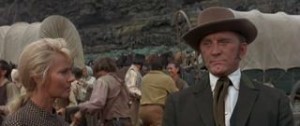 Kirk Douglas is Senator William Tadlock who for some reason has decided to organize a wagon train and lead them to Oregon to found a new colony. It isn’t really explained why he is doing this, although he does have a town plan of sorts drawn up and presumably he would be the mayor/governor of this colony.
Kirk Douglas is Senator William Tadlock who for some reason has decided to organize a wagon train and lead them to Oregon to found a new colony. It isn’t really explained why he is doing this, although he does have a town plan of sorts drawn up and presumably he would be the mayor/governor of this colony.
Robert Mitchum is Dick Summers, their guide, whom Kirk Douglas hires on to lead them to this new and yet to be founded colony. Mitchum provides what could have been a much more interesting character, as he has lost his wife (a Native American woman) and his last physical remembrance of her is a turquoise necklace.
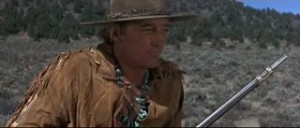 Also, he is apparently going blind, which Kirk Douglas ‘has noticed for some time,’ as he comments about halfway through the two hour run time of this behemoth. How he knows or why this is even important isn’t made clear and is yet another lost opportunity in what could have been a much better picture.
Also, he is apparently going blind, which Kirk Douglas ‘has noticed for some time,’ as he comments about halfway through the two hour run time of this behemoth. How he knows or why this is even important isn’t made clear and is yet another lost opportunity in what could have been a much better picture.
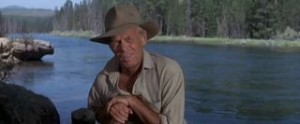 And alas, poor Richard Widmark is Lije Evans, just another settler along for the ride, albeit in a bit of a leadership role. Here he is the mouthpiece for the settlers as they gradually become less and less tolerant of Kirk Douglas’ hard drive and megalomania to get them to Oregon.
And alas, poor Richard Widmark is Lije Evans, just another settler along for the ride, albeit in a bit of a leadership role. Here he is the mouthpiece for the settlers as they gradually become less and less tolerant of Kirk Douglas’ hard drive and megalomania to get them to Oregon.
The plot is extremely trite with the standard encounters along the way. The wagon train encounters rivers to cross, native Americans, and ravines to surpass. Woven throughout this conestoga soap opera are some other storylines, none of which are given much time, although they do introduce us to Sally Field, in her screen debut.
A few less of these side-plots would have allowed more development of the characters of the big three, all of whom must have wondered exactly how much they needed the money to sign on to this. Sadly, outside of a few set pieces which, by definition, don’t tie together well, their talents are wasted.
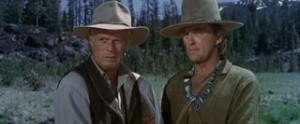 Andrew McLaglen directs and tries really hard to be John Ford and some of the long scenic shots are good copies of the master director, but McLaglen misses much of the rest that makes a Ford picture. Strange that more could not be done with Robert Mitchum or Richard Widmark in what, for them, are atypical roles.
Andrew McLaglen directs and tries really hard to be John Ford and some of the long scenic shots are good copies of the master director, but McLaglen misses much of the rest that makes a Ford picture. Strange that more could not be done with Robert Mitchum or Richard Widmark in what, for them, are atypical roles.
Ultimately I think the thought behind The Way West was to show the myriad of folks and backgrounds who went on these arduous journeys into the relative unknown. Unfortunately, the result – although noble in intent- goes somehow awry and needs more focus on a few storylines to drive more interest. As is, it comes off as more of a high level overview.
What was enjoyable was the score from Bronislau Kaper, which popped in all the right spots – although the theme song (featuring the Serendipity Singers) is pure 60s idealism. It is a very good driving score which rises and falls to perfection in true Kaper fashion. In some cases reminiscent of his signature work for Mutiny on the Bounty.
So I’ve softened somewhat from the initial tone here but still hard to single this out as a stalwart film. I t has been released on both standard DVD and as of now is on Netflix instant too – I’d go the latter route should you be a member.
